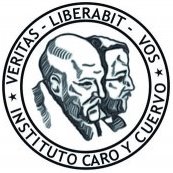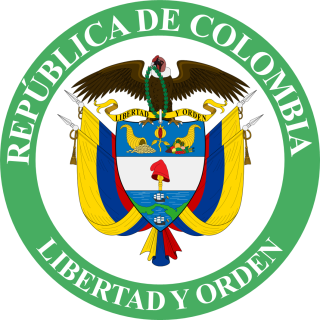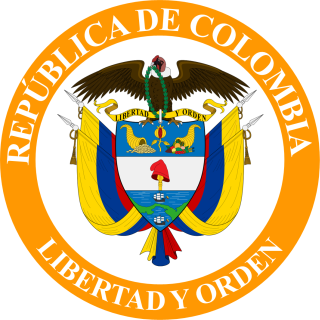
The General Archive of the Nation is a Colombian government agency ascribed to the Colombian Ministry of Culture charged with "conserving the historical legacy, as well as recovering and circulating the documentary heritage of the country". It is the head of the National System of Archives. The headquarters are located in the city of Bogotá and was designed by the architect Rogelio Salmona.

The Ministry of National Defence is the national executive ministry of the Government of Colombia charged with coordinating and supervising all agencies and functions of the government relating directly to national security and the armed forces of Colombia, similar to the defense ministries in other countries. It is composed by the National Army, Navy, Air Force and the National Police.

The Ministry of Commerce, Industry and Tourism or MCIT, is the national executive ministry of the Government of Colombia concerned with promoting economic growth though trade, tourism and industrial growth.

The Ministry of Foreign Affairs also known as the Chancellery, is the Cabinet position of the Government of Colombia responsible for the international relations of Colombia through its diplomatic missions abroad by formulating foreign policy relevant to the matters of the State. It is equivalent to the foreign affairs ministries of other countries.

The Instituto Caro y Cuervo is an educative center specialized in Spanish literature, philology and linguistics, oriented to research and promotion of the reading habits in Colombia. This institute produces editions of Colombian authors and politics of preservation of the bibliographic national heritage. The institute was named after two of the main Colombian linguists, Miguel Antonio Caro Tobar and Rufino José Cuervo Urisarri.

The Institute of Hydrology, Meteorology and Environmental Studies, also known by its acronym in Spanish, IDEAM, is a government agency of the Ministry of Environment and Sustainable Development of Colombia. It is in charge of producing and managing the scientific and technical information on the environment of Colombia, and its territorial composition. The IDEAM also serves as the Colombian institute of meteorology and studies the climate of Colombia.
The National Administrative Department of Solidarity Economy was a Colombian Executive Administrative Department in charge of directing and coordinating government policy to promote, plan, protect, strengthen, and develop the organizations of social economy in order to improve the quality of life of the Colombian people.

The Administrative Department of Sport, Recreation, Physical Activity and the Use of Free Time, Coldeportes is the national government department of sports in and for Colombia; it is charged with fomenting, planning and organizing the activities of sport and physical education.

The Ministry of Environment, Housing and Territorial Development was a national executive ministry of the Government of Colombia charged with determining and regulating the standards and guidelines for the protection of the environment, the improvement and availability of potable water, and the overseeing of housing, territorial development, and sanitation.

Ministry of Information Technologies and Communications, is the national executive ministry of the Government of Colombia responsible for overseeing the information and communication technologies, telecommunications and broadcasting industries in Colombia.
The Ministry of Social Protection was a national executive ministry of the Government of Colombia responsible for coordinating and implementing the national policy and social services relating to employment, labour, health and social security; it operated from 2002 to 2012.

The National Roads Institute (INVÍAS) is an agency of the Executive Branch of the Government of Colombia in charge of allocating, regulating and supervising contracts for highway and roads construction and maintenance.
The Superintendency of Industry and Commerce (SIC) is a competitiveness regulatory agency of the Government of Colombia in charge of regulating fair business practices, promoting competitiveness and acting as the Colombian patent and registration office.

The Superintendency of Corporations is a regulatory agency of the Government of Colombia that oversees corporations
The Nasa Kiwe National Corporation for the Reconstruction of the Páez River Basin and its Surrounding Areas, or Nasa Kiwe Corporation (CNK), is a relief agency of the Government of Colombia created after the 1994 Páez River earthquake and its following aftermath, to help the victims and the affected communities of the Paez River basin area and to finance reconstruction projects.

The Ministry of Health and Social Protection is the national executive ministry of the Government of Colombia responsible for coordinating and implementing the national policy and social services relating to health and social security.

The Ministry of Labour is the national executive ministry of Colombia in charge of formulating, implementing, and orienting labour policy and labour relations to stimulate job growth through job creation programs. It is also in charge of labour rights, pensions, and occupational safety and health in Colombia.

The Ministry of Environment and Sustainable Development is the national executive ministry of the Government of Colombia in charge of formulating, implementing, and orienting environmental policy to ensure the sustainable development of the country.

The Ministry of the Interior is the Cabinet position of the Government of Colombia in charge of managing the relations between the national government and the local administrative divisions; the relations between the executive branch and the legislative branch; and the relations between the Government and Indigenous, Afro-descendant, LGBT, and other vulnerable populations. It is similar to the interior ministries of other countries.














